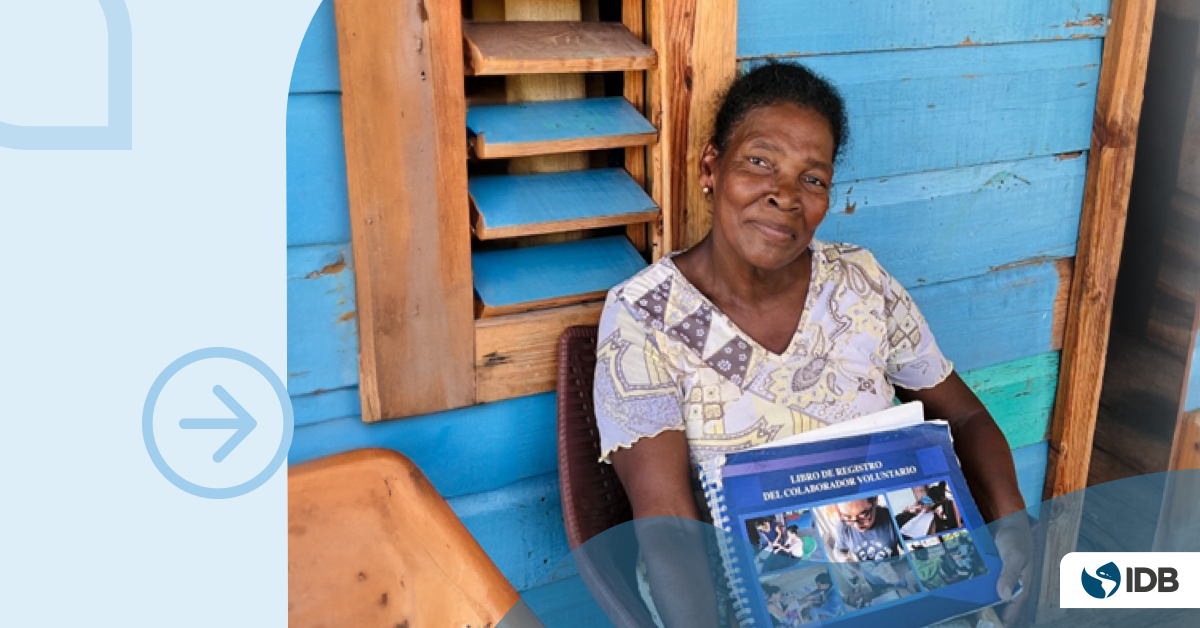Every April 25, the United Nations celebrates World Malaria Day. Malaria is a disease caused by a parasite that claims 600,000 lives each year, mainly children. It is important to emphasize the fundamental role of courageous and committed women who, despite the difficulties, help their families and neighbors to fight the disease. Day by day, they are the heroines of their community.
Claudina has been a Community Collaborator against malaria since July 2018, in the El Muelle neighborhood of Puerto Cabezas, Nicaragua. During hurricanes Eta and Iota, which devastated the Atlantic Coast in November 2020, she completely lost her home and her possessions. These storms also hit communities in Guatemala and Honduras, causing more than 200 deaths and 7 million directly affected in remote and disadvantaged areas that are also struggling with malaria.

The only thing Claudina could salvage was her malaria case record book and the box where she keeps her rapid tests and medicines. She always thinks of the good of her community before herself. Today, she is proud that malaria cases are fewer every day. This brings back her smile.
Dolores is a humble neighbor of Douglas, Belize, a small village in the Orange Walk district, on the banks of the Rio Hondo, the border with Mexico. Douglas has about 500 inhabitants, mainly of Maya Mestizo origin. Although Belize has eliminated autochthonous malaria transmission, it shares borders with countries where active and persistent pockets of the disease still exist. Surveillance is essential to avoid its reintroduction and more victims.

Dolores is 63 years old and has been working as a Community Health Worker for 34 years.
Dolores tells us: “I visit my people in my village. When the sick person cannot come to the center, I go to visit them and take blood for the malaria test. I am happy because now we have rapid tests. I was trained on how to handle them.”
“Now people are used to coming to the health center”, she says. “We prick their finger. We always wear gloves and a mask. When the test is done, I have a number I can call, and they come to pick it up. You can know the result at once, and people are happy to know they don’t have malaria.”
“I work until noon and go back home”, she adds. “With my age and my condition, I feel I’m getting a little tired. Even so, I thank God that I always continue in this job. Thank God that my husband has always been patient with me. When I arrive at noon, he has already made food.”
Dolores decided to support her community in the fight against malaria based on her own experience: “Malaria workers always go to the school and do rapid tests on the children. When my children were young, one of them tested positive. They immediately started treating him. Thanks to that, he did not infect anyone else. Now, my son is tall and strong.”
This heroine of her community proudly shows us the booklet where she registers fever cases and her first aid kit with absorbent cotton, rapid tests, syringes and needles, gloves, always ready to continue collaborating.

Aladi, from the village of Paxcaman, in the Flores District, Petén, Guatemala, is another heroine in the fight against malaria. Every day, she opens the doors of her humble home to her neighbors to administer rapid malaria tests to those who show signs of fever. She has been working as a Volunteer Collaborator for more than 10 years.
Aladi proudly tells us about her fight against the disease. Lately, 3 cases have been detected in her town, so her work is of utmost importance to avoid more contagions. When she identifies a positive case, she immediately contacts the Focus Manager to go to the home of the sick person to take rapid tests of their family members, remind them to use mosquito nets, and alert them to any symptoms of malaria.
In the fight against malaria, the commitment and dedication of local workers stands out, especially the Foci Managers, Volunteer and Community Collaborators, and Community Health Workers, whose work is crucial to prevent, detect, and treat malaria cases.
People like Aladi, Dolores, and Claudina have decided to dedicate their time and effort to the well-being of their neighbors, and every day they make themselves available to take care of their community. They are heroines in the fight against malaria, and on this International Day, the Regional Malaria Elimination Initiative (RMEI) celebrates them.
The RMEI is a public-private partnership, managed and coordinated by the IDB, that seeks to eliminate malaria in Guatemala, Honduras, Nicaragua, Costa Rica, Panama, the Dominican Republic, and Colombia, and to prevent its reintroduction in Belize and El Salvador. It is co-financed by the Bill & Melinda Gates Foundation, the Carlos Slim Foundation, the Global Fund, and the nine beneficiary countries. It has the operational support of the Pan American Health Organization (PAHO), the Clinton Health Access Initiative (CHAI), the Executive Secretariat of the Council of Ministers of Health of Central America (SE-COMISCA), and the Executive Directorate of the Mesoamerica Project (DEPM).


Leave a Reply